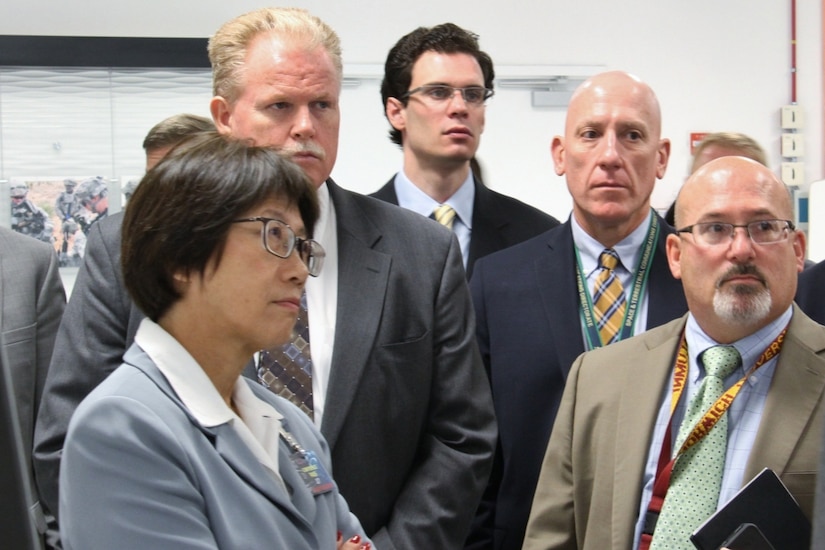
DOD’s Chief Technology Officer Shares Career Advice With Women STEM Majors
By C. Todd Lopez
Believing in yourself is key for professional advancement, said Heidi Shyu, who serves as the undersecretary of defense for research and engineering.

Speaking earlier this month with students at the 2022 Women in STEM conference at the University of California – Los Angeles, Shyu discussed her own career progression, the challenges she faced, and the lessons she learned that allowed her to advance in her career.
After receiving her bachelor’s and master’s degrees in mathematics at UCLA, Shyu applied for work as a defense contractor. A man conducting the interview looked over her resume and asked what made her think she was qualified to be an engineer.
“I was rather shocked at that question,” she said. “I leaned into him and told him, you know I took a complex analysis course in my junior year in which everyone else in the class was an engineer? I was the only female in the class. By the way, I came in No. 1 in the class — by far.”
After the interview, Shyu said she wasn’t sure she’d get the job. But, weeks later, she got an offer from the company.
“I started working in May … 1978, way before you guys were born,” she said. “But the key lesson learned here is you must have self-confidence. You have to believe in yourself.”
Another lesson, she said, is that respect must be earned — it’s not given freely.
A senior scientist in her company had been trying to solve a mathematical equation for months, but was stumped, Shyu said.
“I came back from lunch, and a group of guys in my department was just standing in the hallway,” she said. “When they saw me walking down the hallway, one of the guys sarcastically said, ‘Maybe the new math hire can solve this problem,’ and they also all laughed and chuckled among themselves.”
After approaching that senior scientist, Shyu asked him if she could help.
“The way he answered me, I could realize he didn’t think I was of much value,” she said. “He was very dismissive. He said, ‘Yeah, I’m just trying to solve this problem.’ And I said, ‘Well, sir, may I take a look at it,’ [and] he sort of gave me the problem he was trying to solve.”

That had been a Friday, Shyu said. And the next morning, she got up early to look at what had stumped the scientist for so long.
“I had my cup of coffee and solved the problem … in one hour,” she said.
With plenty of time left that weekend, she provided extra input that allowed her solution to be even more useful.
“Monday morning, I walked into the senior scientist’s office and said, here’s a solution to the three-dimensional problem you’re trying to solve,’” she said. “He was shocked, and he was so happy. After that, I earned his respect. He was teaching a UCLA extension course. I was invited to attend that class without paying tuition … and I did. What are the lessons learned? Respect is not automatic. You have to earn it.”
At another company, Shyu said male co-workers resented her presence in a leadership position. While there, she said she had a deputy working for her who was trying to sabotage her work.
“The key thing I did is, I didn’t play dirty politics,” she said. “I’ve never been a fan of playing dirty politics. I want to rise above that. I kept on working very hard, six days a week, and I worked long hours. I realized that we’re on a very tight schedule. I put all my energy and focus on learning as much as possible, so I don’t have to rely upon a couple of people that’s on the team that are trying to sabotage me.”
She said her hard work paid off because customers took notice of her efforts and the product she was producing.
“I was incredibly dedicated and focused on solving the problems, trying to understand what my customers’ problems are, and doing the best job I can for my customer,” she said. “That actually was the best thing I ever did because it was my customers that raved about me to my managers. The key lessons learned there: Put yourself in your customers’ shoes, trying to understand from their perspective what problems they have that you can try to help them to solve. You will delight your customers, and in return, they will brag about you.”
Shyu also told participants at the conference that it’s important to speak up — to have your voice heard, especially in meetings.
In one position, she said she noticed her male co-workers getting promoted much faster than she was and wondered why.
“I didn’t complain to anybody. I just decided I need to observe my peers,” she said. “What are they doing that helped them to get promoted? What are the things I am not doing? One thing I observed is they’re very good at speaking up in meetings. I was just very quiet; even if I had an idea, I kept it to myself. I didn’t articulate my opinion or my ideas.”

After that realization, she said she learned to speak up in meetings and offer her own opinions and ideas, so that leadership and co-workers would hear what she was thinking.
“Once I started doing that, well, it was amazing,” she said. “The very next year, I got promoted. And two years after that, I got promoted again. So, my promotion came much more rapidly once I learned to communicate and articulate.”
From college students all the way down to kindergartners, Shyu said the Defense Department is doing a lot now to provide those pursuing STEM degrees to come to work within the department or expose young people to STEM concepts so that they might one day choose it as a career.
Last year, for instance, the DOD handed out 416 scholarships for undergraduate and graduate degrees as part of its 2021 Science, Mathematics, and Research for Transformation — or “SMART” — Program. For each year of schooling, DOD pays for, recipients are obligated to do one year of work at DOD.
The program sponsors undergraduate, graduate, and doctoral studies in 21 academic disciplines critical to national security and DOD’s future.
“When you get your degree, I let you come into the department and work in one of the DOD laboratories,” Shyu said. “We have 100 different laboratories. Not only do we pay for your education, but you’ve also got a guaranteed job for four years afterward. It is pretty cool.”
Last year, half of the recipients of the SMART scholarship were women, and 20% were from underrepresented minority groups. Shyu said about 70% of SMART scholarship recipients ultimately decide to continue working within DOD after they finish their service commitment.
In addition to scholarships, the department has held 10 different STEM “summer camps” for junior high school students and hosted robotics competitions for students from kindergarten through high school. This month, DOD is serving as a sponsor for the 2022 FIRST Robotics Competition Championships.
Now the chief technology officer for DOD, Shyu said she’s had her share of challenges in her career. She wanted to share some of those challenges — and solutions — with women students involved in pursuing STEM degrees.
“I know [you] … will face similar types of challenges in your career,” she said. “It’s important for you to realize that you’re not alone facing these challenges, and you too can overcome these challenges. This country is full of opportunities, and you can achieve anything if you’re dedicated if you’re determined, and you have the drive to succeed. Just remember one thing: Never, ever give up. That is your secret to success.”







